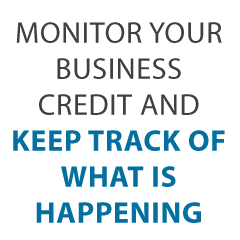- Connect With Us!
- (877) 600-2487
- info@creditsuite.com
How to Make Sure Your Business Credit Cards Don’t Report on Your Consumer Credit Reports – Rock-Solid Advice You Can Take to the Bank
Published By Janet Gershen-Siegel at September 9th, 2017
Make Sure Your Business Credit Cards Don’t Report on Your Consumer Credit
Every business owner should want the same thing: make sure your business credit cards don’t report on your consumer credit.
Many small business credit cards require that the business owner (usually this person is also the cardholder, although not all the time) to personally guarantee the debt. That means that if the balance is not paid off vie the business, then the owner will end up being responsible for the entire amount. It also means that business account activity could potentially spill over to the owner’s personal credit reports. However, this depends upon each card issuer’s policy.
Some card issuers only report activity to the cardholder’s personal credit reports in the case of the owner defaulting, whereas others will report all activity, and will not distinguish between positive and negative activity.
The easiest way to keep business credit activity off your personal credit report is to use a commercial credit card which does not report business activity to personal credit bureaus. Don’t use a personal credit card for business if you can help it. However, the decision to use a card such as this should not be made lightly. Still, it will often pay to use business credit cards that do not report to personal credit.
Benefits and Burdens of Business Credit Cards Which Don’t Report on Your Consumer Credit
Which is better? It all depends upon your situation. If you pay your business card on time and avoid high balances, then a business card that appears on your personal credit reports with Experian, Equifax, and TransUnion should not be a problem. It could even help your credit scores. Many business card companies will be more than happy to let you pay with personal credit.
So does American Express business card report to credit bureaus? Maybe. Read on.
Credit Utilization Could Suffer
However, if you charge everything you can on your card in order to rack up rewards, then your personal credit could conceivably suffer. Credit scoring models will take into consideration your debt usage or utilization ratio. This compares the reported balances versus available credit limits. It is often for each card as well as all credit cards combined. A high balance on a business card which appears on your personal credit can mean a higher debt usage ratio. And that can lower credit scores.
And paying the balance off in full every month alone is unlikely to solve this problem. The reported balance is often the balance as of the statement closing date, and not after a payment has been made. Therefore, if you want lower balances to get onto the reports, you need to make your payments before either the statement closing date, or whichever date the issuer reports.
But it Can Help Build a “Thin” Credit Profile
However, if you are establishing business credit with bad personal credit, a business card which reports your full account activity could help. Hence if you avoid credit cards and use a debit card, you may have a “thin” credit profile. It could benefit from the boost another card could provide.
Opting for a business credit card which does not report to personal credit may help. This can be if you know there will be times you need to run up charges putting you close to the limit or carry a balance. This could be for anything from investing in new equipment to spending to prepare for a trade show. Of course you do not want that activity to bring down your scores. You’ve got enough problems getting business credit cards bad personal credit.
Make Sure Your Business Credit Cards that Do Not Report to Personal Credit: Use a Business Credit Card That Doesn’t Affect Personal Credit
Does business credit affect personal credit? Generally, it’s better to apply for the business credit card which offers rewards and benefits of the most interested to you, rather than focusing solely on the card’s reporting policy.
Furthermore, if you default, then having a business credit card which does not report regularly to consumer credit bureaus will make no difference. You will still end up personally liable for the debt on the card. This is if you signed a personal guarantee. A personal guarantee is a part of nearly all small business credit card agreements. That is, if you use your Social Security Number to guarantee the card and not just for verification purposes.
So if the card issuer brings a lawsuit against you for the balance or sends the account to a collections agency, then this activity will likely show up on your personal credit report. That can happen regardless of how any other payment information is reported. So, can personal creditors go after llc? Yes, if you guarantee your debt personally. Do business credit cards affect personal credit? Yes, if you guarantee your business credit debt personally.
But you want a business credit card no personal credit check, right? Then how to get business credit without using personal credit? You want business credit cards without personal credit.
Make Sure Your Commercial Business Card Won’t Report on Your Consumer Credit: Another Option
You may be wondering: how can I get a company credit card in my name? Another way out is to use a business credit card not requiring a personal guarantee. However, those are few and far between until you establish business credit. The business credit without personal guarantee list is short without built business credit.
These sorts of cards ask you, the business owner, to meet a set of conditions which can differ from one product to another. These could be annual sales guarantees. Or they might be requirements to have an open Dun & Bradstreet file or other conditions. If you cannot meet these conditions, then this option will not exist for your business at all. You wouldn’t be able to get which business credit cards do not report personal credit.
And if you’re asking, does American Express business card report to credit bureaus – then the answer is no, if you offer a personal guarantee.
So, instead, you should …
Make Sure Your Business Credit Cards That Don’t Report to Personal Credit: Build Business Credit and Get Options
Business credit is credit in a business’s name. It doesn’t attach to an owner’s individual credit, not even when the owner is a sole proprietor and the solitary employee of the business.
Because of this, a business credit vs personal credit scores can be very different.
The Benefits
Considering that small business credit is independent from personal, it helps to protect a small business owner’s personal assets, in the event of court action or business bankruptcy.
Also, with two distinct credit scores, a business owner can get two different cards from the same merchant. This effectively doubles buying power.
Another advantage is that even startups can do this. Heading to a bank for a business loan can be a formula for frustration. But building small business credit, when done right, is a plan for success.
Consumer credit scores are dependent on payments but also various other considerations like credit use percentages.
But for small business credit, the business credit card credit score will actually just depend on if a business pays its debts punctually. So does a company credit card build credit? You better believe it.
Learn more here and get started toward building small business credit.
The Process
Establishing company credit is a process, and it does not occur without effort. A business must proactively work to establish small business credit.
That being said, it can be done easily and quickly, and it is much speedier than developing a personal credit score.
Vendors are a big component of this process.
Accomplishing the steps out of order will cause repetitive denials. Nobody can start at the top with small business credit. For example, you can’t start with retail or cash credit from your bank. If you do, you’ll get a denial 100% of the time.
Make Sure Your Business Cards That Don’t Report to Personal Credit: Small Business Fundability
A business has to be fundable to lending institutions and merchants.
That is why, a business will need a professional-looking website and email address. And it needs to have website hosting from a merchant like GoDaddy.
In addition, company telephone and fax numbers must have a listing on ListYourself.net.
Additionally, the business phone number should be toll-free (800 exchange or the like).
A company will also need a bank account dedicated purely to it, and it must have every one of the licenses essential for operating.
Licenses
These licenses all must be in the specific, correct name of the business. And they need to have the same small business address and telephone numbers.
So keep in mind, that this means not just state licenses, but potentially also city licenses.
Make Sure Your Business Credit Cards Don’t Report on Your Consumer Credit: Dealing with the Internal Revenue Service
Visit the Internal Revenue Service website and acquire an EIN for the business. They’re free of charge. Choose a business entity like corporation, LLC, etc.
A company can begin as a sole proprietor. But they will most likely wish to switch to a variety of corporation or an LLC.
This is in order to reduce risk. And it will maximize tax benefits.
A business entity will matter when it pertains to tax obligations and liability in the event of litigation. A sole proprietorship means the owner is it when it comes to liability and tax obligations. Nobody else is responsible.
Sole Proprietors Take Note
If you run a business as a sole proprietor, then at least be sure to file for a DBA. This is ‘doing business as’ status.
If you do not, then your personal name is the same as the company name. Therefore, you can wind up being directly liable for all business debts.
Additionally, according to the IRS, with this structure there is a 1 in 7 possibility of an IRS audit. There is a 1 in 50 possibility for corporations! Steer clear of confusion and drastically decrease the odds of an Internal Revenue Service audit simultaneously.
Make Sure Your Business Credit Cards Don’t Report on Your Consumer Credit: Beginning the Business Credit Reporting Process
Start at the D&B web site and get a free D-U-N-S number. A D-U-N-S number is how D&B gets a small business in their system, to produce a PAYDEX score. If there is no D-U-N-S number, then there is no record and no PAYDEX score.
Once in D&B’s system, search Equifax and Experian’s websites for the small business. You can do this at fastcs.wpengine.com/reports. If there is a record with them, check it for accuracy and completeness. If there are no records with them, go to the next step in the process.
In this way, Experian and Equifax will have something to report on.
Make Sure Your Business Credit Cards Don’t Report on Your Consumer Credit: Vendor Credit Tier
First you ought to build trade lines that report. This is also known as the vendor credit tier. Then you’ll have an established credit profile, and you’ll get a business credit score.
And with an established business credit profile and score you can begin to acquire credit in the retail and cash credit tiers.
These types of accounts often tend to be for the things bought all the time, like marketing materials, shipping boxes, outdoor work wear, ink and toner, and office furniture.
But to start with, what is trade credit? These trade lines are credit issuers who will give you preliminary credit when you have none now. Terms are oftentimes Net 30, instead of revolving.
So, if you get approval for $1,000 in vendor credit and use all of it, you will need to pay that money back in a set term, like within 30 days on a Net 30 account.
Learn more here and get started toward building small business credit.
Details
Net 30 accounts must be paid in full within 30 days. 60 accounts must be paid fully within 60 days. In comparison with revolving accounts, you have a set time when you must pay back what you borrowed or the credit you used.
To launch your business credit profile properly, you need to get approval for vendor accounts that report to the business credit reporting agencies. When that’s done, you can then make use of the credit.
Then repay what you used, and the account is on report to Dun & Bradstreet, Experian, or Equifax.
Vendor Credit Tier – It Helps
Not every vendor can help like true starter credit can. These are vendors that will grant an approval with a minimum of effort. You also want them to be reporting to one or more of the big three CRAs: Dun & Bradstreet, Equifax, and Experian.
You want 5 to 8 of these to move onto the next step, which is the retail credit tier. But you may have to apply more than once to these vendors. So, this is to validate you are dependable and will pay timely.
Uline Shipping Supplies
Uline Shipping Supplies is a true starter vendor. You can find them online at www.uline.com. They offer shipping, packing, and industrial supplies, and they report to D&B.
You have to have a D-U-N-S number. They will request 2 references and a bank reference. The initial few orders may have to be paid in advance to initially get approval for Net 30 terms.
Quill
Quill is an additional true starter vendor. You can find them online at www.quill.com. They sell office, packaging, and cleaning supplies, and they report to D&B and Experian.
Because Quill reports to two separate credit reporting agencies, you get two credit experiences with them. Place an initial order first unless the D&B score is developed.
Generally they will put you on a 90-day prepayment schedule. If you order items monthly for 3 months, they will usually approve you for a Net 30 Account.
Grainger Industrial Supply
Grainger Industrial Supply is also a true starter vendor. You can find them online at www.grainger.com. They sell safety equipment, plumbing supplies, and more, and they report to D&B. You will need to have a business license, EIN, and a D-U-N-S number.
For less than a $1000 credit limit they will approve virtually anyone with a business license.
Accounts That Don’t Report
Non-Reporting Trade Accounts can also be helpful. While you do want trade accounts to report to at the very least one of the CRAs, a trade account which does not report can nevertheless be of some worth.
You can always ask non-reporting accounts for trade references. And credit accounts of any sort will help you to better even out business expenditures, therefore making financial planning less complicated. These are providers like PayPal Credit, T-Mobile, and Best Buy.
Make Sure Your Business Credit Cards Don’t Report on Your Consumer Credit: Retail Credit Tier
Once there are 5 to 8 or more vendor trade accounts reporting to at least one of the CRAs, then progress to the retail credit tier. These are service providers which include Office Depot and Staples.
Just use your Social Security Number and date of birth on these applications for verification purposes. For credit checks and guarantees, use the company’s EIN on these credit applications.
One example is Lowe’s. They report to D&B, Equifax and Business Experian. They need to see a D-U-N-S and a PAYDEX score of 78 or better.
Make Sure Your Business Credit Cards Don’t Report on Your Consumer Credit: Credit Tier
Are there 8 to 10 accounts reporting? Then move to the fleet credit tier. These are companies such as BP and Conoco. Use this credit to purchase fuel, and to fix, and maintain vehicles. Just use your Social Security Number and date of birth on these applications for verification purposes. For credit checks and guarantees, make sure to apply using the small business’s EIN.
One such example is Shell. They report to D&B and Business Experian. They need to see a PAYDEX Score of 78 or higher and a 411 company phone listing.
Shell may say they want a particular amount of time in business or profits. But if you already have enough vendor accounts, that won’t be necessary. And you can still get approval.
Learn more here and get started toward building small business credit.
Make Sure Your Business Credit Cards Don’t Report on Your Consumer Credit: Cash Credit Tier
Have you been responsibly managing the credit you’ve gotten up to this point? Then progress to the cash credit tier. These are companies like Visa and MasterCard. Just use your SSN and date of birth on these applications for verification purposes. For credit checks and guarantees, use your EIN instead.
One example is the Fuelman MasterCard. They report to D&B and Equifax Business. They need to see a PAYDEX Score of 78 or better. And they also want you to have 10 trade lines reporting on your D&B report.
Plus, they want to see a $10,000 high credit limit reporting on your D&B report (other account reporting).
Also, they want you to have an established small business.
These are businesses such as Walmart and Dell, and also Home Depot, BP, and Racetrac. These are usually MasterCard credit cards. If you have 14 trade accounts reporting, then these are feasible.
Make Sure Your Business Credit Cards Don’t Report on Your Consumer Credit: Monitor Your Business Credit
Know what is happening with your credit. Make sure it is being reported and attend to any inaccuracies as soon as possible. Get in the habit of taking a look at credit reports and digging into the specifics, and not just the scores.
We can help you monitor business credit at Experian and D&B for only $24/month. See: fastcs.wpengine.com/monitoring.
At D&B you can monitor at: www.dandb.com/credit-builder. At Experian, you can monitor your account at: www.smartbusinessreports.com/Landing/1217/. And at Equifax, you can monitor your account at: www.equifax.com/business/business-credit-monitor-small-business. Experian and Equifax cost about $19.99; D&B ranges from $49.99 to $99.99.
Update Your Record
Update the relevant information if there are inaccuracies or the relevant information is incomplete. At D&B, you can do this at: https://iupdate.dnb.com/iUpdate/viewiUpdateHome.htm. For Experian, go here: www.experian.com/small-business/business-credit-information.jsp. And for Equifax, go here: www.equifax.com/business/small-business.
Make Sure Your Business Credit Cards Don’t Report on Your Consumer Credit: Fix Your Business Credit
So, what’s all this monitoring for? It’s to dispute any inaccuracies in your records. Mistakes in your credit report(s) can be corrected. But the CRAs typically want you to dispute in a particular way.
Get your small business’s PAYDEX report at: www.dnb.com/about-us/our-data.html. Get your company’s Experian report at: www.businesscreditfacts.com/pdp.aspx?pg=SearchForm. And get your Equifax business credit report at: www.equifax.com/business/credit-information.
Disputes
Disputing credit report errors typically means you send a paper letter with copies of any evidence of payment with it. These are documents like receipts and cancelled checks. Never mail the originals. Always send copies and keep the originals.
Fixing credit report errors also means you precisely itemize any charges you challenge. Make your dispute letter as understandable as possible. Be specific about the issues with your report. Use certified mail so that you will have proof that you mailed in your dispute.
Dispute your or your small business’s Equifax report by following the instructions here: www.equifax.com/small-business-faqs/#Dispute-FAQs.
You can dispute inaccuracies on your or your business’s Experian report by following the directions here: www.experian.com/small-business/business-credit-information.jsp.
And D&B’s PAYDEX Customer Service telephone number is here: www.dandb.com/glossary/paydex.
Make Sure Your Business Credit Cards Don’t Report on Your Consumer Credit: A Word about Business Credit Building
Always use credit smartly! Don’t borrow beyond what you can pay back. Keep an eye on balances and deadlines for payments. Paying punctually and completely will do more to boost business credit scores than just about anything else.
Growing small business credit pays off. Good business credit scores help a company get loans. Your lender knows the company can pay its financial obligations. They understand the business is authentic.
The small business’s EIN connects to high scores and loan providers won’t feel the need to require a personal guarantee.
Business credit is an asset which can help your company in years to come.
Make Sure Your Business Credit Cards Don’t Report on Your Consumer Credit: Takeaways
Finally, as always, it literally pays to separate your business life from your personal life, by opening separate accounts and even incorporating your business. Do so in order to demonstrate to creditors that you and your company are not the same when it comes to credit. You can get business credit cards that don’t report to personal credit.

 " class="attachment-blog-single size-blog-single wp-post-image" alt="Get Business Credit Cards for New Businesses Credit Suite-Business Line of Credit Decoded" title="Get Business Credit Cards for New Businesses">>
" class="attachment-blog-single size-blog-single wp-post-image" alt="Get Business Credit Cards for New Businesses Credit Suite-Business Line of Credit Decoded" title="Get Business Credit Cards for New Businesses">>


